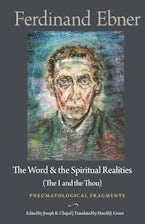- Home
- philosophy
- The Word and the Spiritual Realities (the I and the Thou)
Preparing your PDF for download...
There was a problem with your download, please contact the server administrator.
The Word and the Spiritual Realities (the I and the Thou)
Pneumatological Fragments
Translated by Harold J. Green
Edited by Joseph R. Chapel
Introduction by Krzysztof Skorulski
Imprint: Catholic University of America Press
This volume will constitute the first published English translation of Ferdinand Ebner’s seminal 1921 work, Das Wort und die geistigen realitäten – long available in major languages but never in English. It is frequently compared with Martin Buber’s, I and Thou, published in 1923, which actually draws its central I-Thou insight from Ebner.
In recent centuries, Philosophy reflects a turn toward the autonomous subject vs. a biblical sense of person. The limits/failures of science manifest in the horrors of World War I led to the emergence of a "Dialogical Personalist Philosophy" in reaction to the universal doubt of Cartesian thought and to German Idealism, which engages the idea or representation but not the reality of "things-in-themselves."
The core of Ebner: human speech is constitutive of human existence: humans are given the "word." "Having the word" is a miraculous gift from God. It is only in the word, in language, that an "I" meets a "Thou," that relationship and self-identity can occur, and this word is given in Jesus Christ, the Word made flesh: "In the beginning was the Word"; Jesus, the Logos of St. John's Gospel, mediates between God and man and "stands" between I and Thou. It is through Jesus that it is possible to address God in the human thou.
The key to life’s meaning, to the centrality of relationship, and to God's continuous action in His creation, is found in the I-Thou question: why the I can never be found in itself, and so must look in the thou, while the false I will try to possess the thou as an object of power. This is Ebner's critique of idealist thought: reality, truth, and personal identity are neither ideas, nor found in ideas, therefore, Descartes' cogito must be rejected, for the existence of the I can't be founded or proved by solitary thinking, but only in relation with a thou.
Ferdinand Ebner (1882–1931) was a schoolteacher and a dialogical philosopher. Harold J. Green is Adjunct Faculty for the Eastern Iowa Community Colleges. Joseph R. Chapel is adjunct professor of moral theology, Seton Hall University.
"I commend the team who bring in English garb Ebner’s major study The Word and the Spiritual Realities, to a new generation! Joseph Chapel renders a fine overview of the I-Thou relationship by scholars from the past century to assist those espousing authentic dialogue as a necessary foundation for true peace and harmony in every level of society in our time."
~Lawrence E. Frizzell, Seton Hall University
"The world of scholarship owes an immense debt of gratitude to the editor, translator, and CUA Press for bringing this compelling book to print. Now, Ferdinand Ebner’s powerful and original insights into how God calls and establishes us in his Word are available to English-speaking audiences. And at a time when language analysis is central to the philosophical enterprise, Ebner’s ‘dialogical personalism’—which insists on the foundational relationship between the spoken word and human identity—can serve as an essential and crucial resource. Theologians, philosophers, and all those involved in contemporary anthropological studies will benefit enormously from having this fine translation and enlightening introduction conveniently accessible to them."
~Thomas G. Guarino, author of The Disputed Teachings of Vatican II: Continuity and Reversal in Catholic Doctrine
"Ferdinand Ebner wrote the ‘fragments’ in German in 1918-19 immediately after World War I --now published here for the first time in English. They constitute a powerful critique of the mentality, social attitudes, intellectual tendencies, and religious values that led up to the terrible war that left Europe in shambles...I can only hope that their appearance in English today can assist us in coping with our own times, which are, for all the radical differences between then and now, in their way, no less problematic."
~Walter Methlagl, Professor Emeritus, University of Innsbruck

